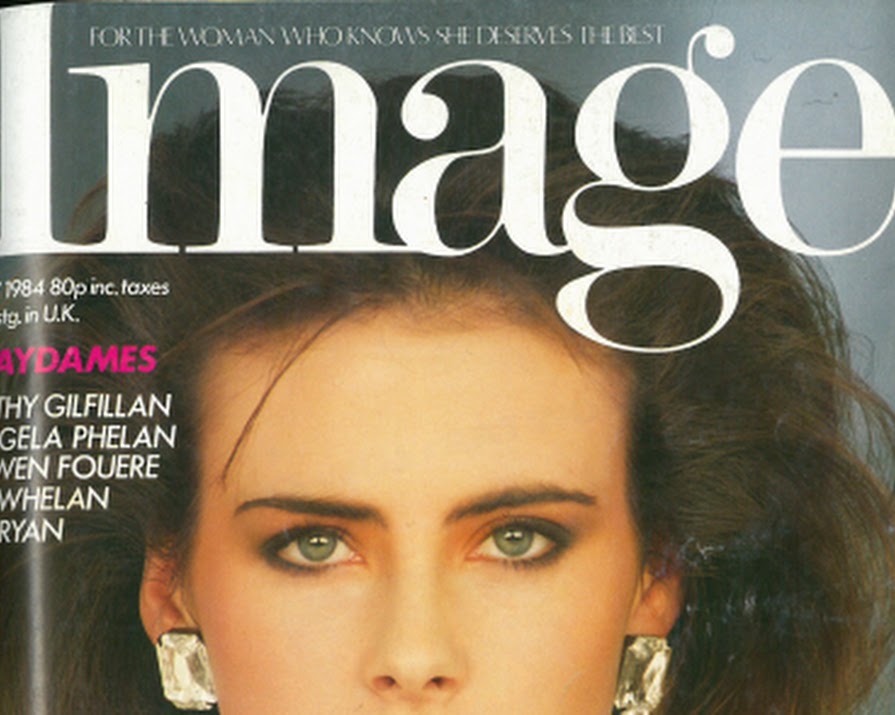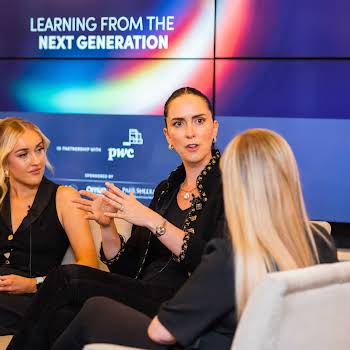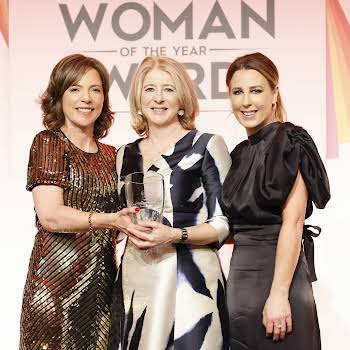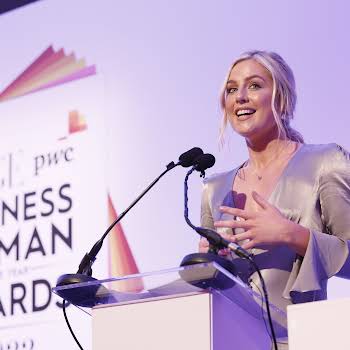
By Erin Lindsay
19th Nov 2018
19th Nov 2018
Tonight, we’re honouring Anne Harris, journalist and former editor of the Sunday Independent and our own IMAGE magazine, with our Lifetime Achievement Award at the IMAGE Businesswoman of the Year Awards. Anne has had a stellar lifelong career in publishing, and we wanted to honour her time at IMAGE especially. We dug through our archives, and found Anne’s first edition of IMAGE as editor, from May 1984, over 30 years ago. For this issue, Anne interviewed the Dáil’s newest Minister for Education Gemma Hussey, in a landmark interview that saw a brighter future of more women in politics. This is that wonderful piece.
The new women in the government must seem like a lifeline for those of us who longed for courageous female voices in high places, but are there signs that it may, after all, be a Sindy Dáil?
Anne Harris talks to our new Minister for Education, Gemma Hussey.
The office of the Minister for Education had the vacant look of an office for rent. Resisting the temptation to tell the porter I’d take it, I absentmindedly sat in the Minister’s chair. Then I noticed the ruler on the desk. Mentally sucking my knuckles, I moved to a humbler seat. The previous day’s papers lay unopened on a table. I left them alone. Looking at the desk I wondered if there was something nasty for ASTI in the drawers. Philip Marlowe would have wondered if there was a fifth of bourbon there as well and urged me to put my feet on the desk. Philippa Marlowe just cooled her heels thinking about the Women’s Political Association, who had kindly dug the space in Leinster House for Gemma Hussey.
In the women’s saga, the WPA came after the Media Feminists and the later and more serious Equal Pay Women. Originally it was called the Women’s Progressive Association and said it had no party politics. This meant that it could be taken over by Fianna Fail or Fine Gael on the old Mexican adage; “Show me a man who says he has no politics and I will show you an agent of the secret police.” From 1973 onwards, Monica Barnes, Nuala Fennel and Gemma Hussey moved it steadily towards its natural political home in the constituency of middle-class women with a second car and nowhere to drive after they dropped the children off at school.
It was inevitable that the WPA would be attracted to that constituency of the mind watched over by Garret Fitzgerald. The WPA mind, or whoever does the talking for it, called Gemma Hussey’s appointment a “watershed”. They meant for women. We would see.
As I am thinking these sombre thoughts, the watershed bustles into the office, looking very good in a grey swagger coat, navy sweater and pleated skirt. Around her neck is a silk scarf, not tight like in Raymond Chandler so as to inconvenience her breathing but tied up in a beautiful feminine bow. We make a limp compromise in the handshake and I ask her is she getting used to being called “Minister”.
“Amazingly, yes. I thought it would be hard at the beginning. But I’m quite used to it.” She has been in office twelve working days and it might have been twelve years. She takes off her coat and leans her hands on her desk. On her pinkey she displays a nice rock of the masculine variety; there’s nothing wrong in the mining department. I ask the Minister for Education whether she is bothered at having to announce the first Coalition bad news- the school transport cuts.
“No. These were the effects of the previous Government’s Budget estimates. I felt it was unfair to parents to delay the announcement. I felt that whatever the decision, people have to face the nasty bits.”
We sat there, she quite relaxed, me thinking about the nasty bits. Out of delicacy she didn’t tell me all the other nasty bits which she was reserving for the secondary and vocational schools later that month. Then she shook herself back into her “Yes Minister” role. I steeled myself for some philosophical reflections on the Role of Education in society.
“You have to ask yourself, what kind of education can a country afford. I personally would like to see every level of education free, particularly third level education. But that just doesn’t happen.
The Irish are becoming more realistic, I think. Personally I’m sorry to have achieved Cabinet status just at the time when we all have to become realistic. But if my only achievement is to be a member of the Government that brought us back into line, then I will be satisfied.”
Realism not being my favourite theme, when other people are being realistic for me, I let Philippa think about that fifth of bourbon and change the subject to the Women’s Political Association. Are they a political lobby?
The Minister sighs with relief, takes her hand off the desk, pushes her chair back easily and thinks aloud. She likes this question.
“The WPA. Ah yes, my sisters…of course I see them as a political lobby. Very much so. When I was invited to join, it was the Women’s Progressive Association. Before I knew where I was, I was chairperson. The first thing I did was change the name to Women’s Political Association. I believe in calling a spade a spade.”
So do I. With it’s three leading members, Barnes, Fennell and Hussey, in big politics, I thought it was time the WPA stopped calling its Fine Gael spade a non-party shovel. The Minister wasn’t having any.
“Well, the WPA is absolutely outside politics, the committee is a mixed political bag. It’s made up of people of all parties and no parties. When I was chairperson, I wasn’t in politics at all.”
I thought about her not being in politics. It hurt my head. From 1977 onwards, only the politically naïve could miss the fact that the WPA had become a Fine Gael Limbo-a place or state where political innocents rested in perfect happiness, except that they could not yet see the face of Garrett the Good. These pure spirits got a baptism of cold water when first Barnes and then Fennell declared for Fine Gael. The Minister explained the WPA’s selective welcome for herself.
“They obviously felt that I was the first woman to have come up by herself, to have come up through the women’s movement…I don’t mean that the women’s movement put me there. My own work put me there. Eileen Desmond and Maire Geoghegan Quinn would never have come into politics without family connections… I was the first woman in a senior Cabinet position to come up through the women’s movement. I began in women’s politics.”
Since the Minister was claiming to have risen from ‘women’s politics” it seemed fair to find out where she stood on issues bearing directly on women. Take the constitutional amendment on abortion.
“I’ve always been totally consistent in my position on abortion. I’m opposed to it…Of course I was very sympathetic to June Levine’s book. I sympathised with her abortion and all she went through…but then there are a lot of people who just think to themselves ‘Well I won’t have that baby because it would interfere with my holiday this year…’ That’s what people tell me. I have no difficulty at all with the wording of the referendum. I agree with Garrett. The Constitution is defective in this area… But I’ll be glad when this referendum, is over. So will Garrett.”
I sucked my teeth for a while thinking of the referendum and how it will be a relief to Garrett to have it over. And how that would be a relief for the ten thousand women each year who will go on having abortions after the referendum is over. I really felt like the fifth of bourbon. I changed the subject to divorce.
“I’m against it. Have you read any books on divorce, Anne? Once you have it, it’s easy to see the situation clearly. Where divorce is easy the sufferers are the women and children. Take America…” The Minister is relaxed. Then she notices that I’m not taking America and she searches around for a clinching anecdote that will convince me.
“For example a friend of mine walked into a casino in Cannes recently. And the whole place was full of rich, middle-aged, divorced men with young women hanging on their arms…”
I look incredulous. I wonder aloud what middle-aged men fooling around have to do with divorce in Ireland. I tell her of places in Dublin where married, middle-aged men walk around like Christmas trees, festooned with young women…The Minister says: “Well, I’d like to see middle-aged women doing something too.” Like having young men hanging on their arms? I ask her should the thousands of unhappy marriages in Ireland continue? The Minister gets realistic again. “Well you can’t legislate for perfection.”
It was hardly fair to ask a Minister fresh into office about the nitty gritty of education. So I questioned her on child-care facilities. Would she press the Cabinet to give a tax concession to employers who set up crèches?
“There, you see, you just don’t understand. That would cost the Government money. You think it doesn’t, but indirectly it comes out of the exchequer…Look, I know it’s right and desirable to have child-care facilities, but we have to deal with the economic crisis first.”
But it’s not all economics. While the Minister is tough about crèches, she’s solid on the kids’ right to the Irish language. When I mention that Irish might be having another credibility problem in the schools, the Minister looks at me like I was the murderer in Pearse’s Murder Machine. “If a country doesn’t have it’s own language,” she intones, it quickly loses it’s soul.”
I think about the country’s soul for a while with the usual morbid results. I settle for the mental promise to half a bottle of bourbon and decide to give me and the Minister a rest by batting around easy stuff like class sizes in national schools (“It’s gradually been improving”), employing more teachers (“Has to be balanced against the Budget”) and school entry age (“It’s fixed- it’s six, actually, but they let them in at four”). There is hopeful talk about disadvantaged children, pre-schooling and school meals, all of which I mentally resolve to check out with my contact at police headquarters, Lt. Christina Murphy, and which I forget to do because of the bourbon and the fact they all depend on the Budget to which the Minister tells me she is totally committed, so I am fairly sure that things are not going to get better.
The Minister and I are getting tired. She shuffles the ruler and the phone around the desk. She makes a phone call. She tells me she has a lot of energy which I believe. She tells me she has a restless mind and needs to be challenged. She doesn’t mean, I think, being challenged by the teacher’s unions. Nor does she tell me about the cutbacks in secondary and vocational schools which she is to announce later in the month. She tells me she thinks the biggest challenge in the world is the Budget, while I am thinking of her friend who watches middle-aged men in Cannes fooling around and thinking that is where I would like to be.























